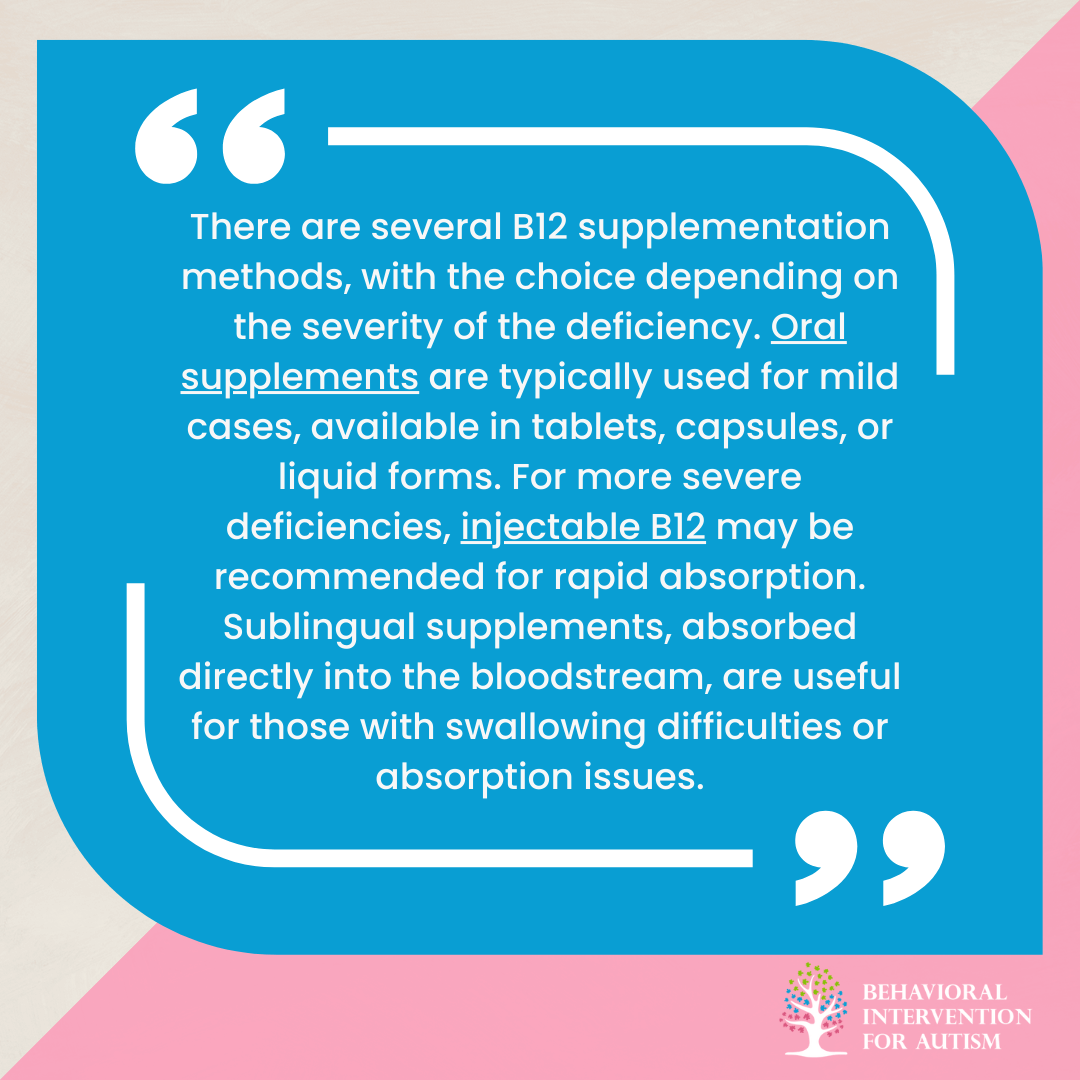
Table of Contents
Vitamin B12 plays a crucial role in the overall health and well-being of the human body. Its deficiency can have significant impacts, particularly in individuals with autism, who may also experience food issues that affect their nutrient intake. Understanding the role of B12 and how its deficiency affects those with autism is essential for providing appropriate nutritional support.
The Role of Vitamin B12 in the Body
Vitamin B12, also known as cobalamin, is a water-soluble vitamin that is vital for various bodily functions. It is essential for:
- Red blood cell formation
- DNA synthesis
- Neurological function
- Energy production
B12 ensures the proper functioning of the brain and nervous system, which involves the production of myelin, a protective sheath around nerves. It also helps in the synthesis of neurotransmitters, which are crucial for mood regulation and cognitive functions.
How B12 Deficiency Can Impact Individuals with Autism
Given the potential for B12 deficiency to impact individuals with autism, it’s essential to understand the range of symptoms that may arise from this deficiency. These effects can range from neurological to gastrointestinal issues, and they often amplify the challenges already faced by individuals on the spectrum. Below is an overview of how B12 deficiency can influence various aspects of health:
Impact of B12 Deficiency | Description |
Neurological Symptoms | Increased irritability, mood swings, and cognitive impairments |
Anemia | Develops due to inadequate red blood cell formation, causing fatigue and weakness |
Gastrointestinal Symptoms | Issues such as constipation, diarrhea, and poor appetite |
Delayed Development | Potential delay in developmental milestones, particularly in young children |
Nerve Damage | Increased risk of neurological issues, including numbness and tingling |
Understanding the crucial role that Vitamin B12 plays in the body and recognizing the specific impacts of its deficiency on individuals with autism can guide better nutritional and medical interventions.

Identifying B12 Deficiency in Autistic Individuals
Recognizing B12 deficiency is crucial for individuals with autism spectrum disorder (ASD). The following focuses on the symptoms of B12 deficiency and the diagnostic methods used to detect it.
Symptoms of B12 Deficiency
Vitamin B12 deficiency can manifest in various ways, some of which may overlap with the symptoms often seen in individuals with autism. It’s essential to identify these symptoms to ensure timely intervention.
Common symptoms of B12 deficiency include:
- Fatigue and weakness
- Difficulty concentrating or memory problems
- Mood changes, such as irritability or depression
- Numbness or tingling in hands and feet
- Balance issues and unsteadiness
- Pale or jaundiced skin
- Glossitis and mouth ulcers
Specifically in individuals with autism, additional symptoms might include:
- Increased frequency of meltdowns
- Regression in acquired skills
- Deterioration in speech and communication
- Heightened sensory sensitivities
Diagnostic Methods for Detecting B12 Deficiency in Individuals with Autism
Diagnosing B12 deficiency requires specific medical tests. Healthcare professionals use various methods to determine if an individual is deficient in this vital nutrient.
Common diagnostic methods include:
- Blood Tests: A complete blood count (CBC) and B12 serum test are often the first steps. These tests can reveal abnormal red blood cells and low levels of B12.
- Methylmalonic Acid Test: Elevated levels of methylmalonic acid in the blood or urine can indicate B12 deficiency.
- Homocysteine Test: High levels of homocysteine in the blood can be another sign of low B12 levels.
- Schilling Test: Although less commonly used today, this test can determine if the body is absorbing B12 properly.
It’s essential for parents and caregivers to consult with healthcare providers for proper testing and diagnosis. Identifying B12 deficiency early can help mitigate its impact on individuals with autism, improving their overall health and well-being.
Treatment Approaches
Effective treatment of B12 deficiency in individuals with autism requires professional guidance. It’s crucial to consult healthcare providers, such as pediatricians, nutritionists, and neurologists, who can assess the individual’s needs and ensure the treatment is safe and effective. These specialists conduct evaluations, accurately diagnose B12 deficiency, recommend supplementation, and monitor the individual’s response to treatment.

Regular monitoring of B12 levels is crucial to track progress and adjust treatment as needed. Healthcare providers use blood tests to measure B12 levels and ensure they remain within a healthy range. The frequency of these tests depends on the severity of the deficiency and the method of supplementation used, such as daily oral or sublingual supplements or weekly/monthly injections.
Ensuring adequate B12 levels through professional consultation and tailored supplementation can greatly improve the health and well-being of individuals with autism who have B12 deficiency. Proper treatment helps enhance their overall quality of life, with the guidance of healthcare providers ensuring the best possible outcomes.
Lifestyle Considerations
A balanced diet is essential for overall health and well-being, particularly for individuals with autism. Proper nutrition supports cognitive function, self-regulation, and physical health, while a well-rounded diet can help manage autism symptoms and enhance quality of life.
Nutritional needs vary, but a diet rich in essential vitamins and minerals is crucial. Specifically, Vitamin B12 plays a key role in brain function and red blood cell production, making it particularly beneficial for individuals with autism. Ensuring adequate B12 intake can significantly improve their overall condition.
Some common sources of Vitamin B12 include:
Food | Vitamin B12 Content (µg per 3 oz) |
Beef Liver | 70.7 |
Clams | 84.1 |
Fish (e.g., Salmon, Trout) | 4.8 – 5 |
Dairy Products (e.g., Milk, Yogurt) | 0.9 – 1.2 |
Eggs | 0.6 |
Fortified Breakfast Cereals | 1.5 – 6 |
Parents and caregivers should monitor the dietary intake of individuals with autism to ensure they are consuming sufficient amounts of these foods. For those with dietary restrictions, fortified foods or supplements, under the guidance of a healthcare provider, can help meet the necessary B12 intake.
By prioritizing a balanced diet and incorporating B12-rich foods, parents and caregivers can play an essential role in supporting the health and wellbeing of individuals with autism.
Explore How We Can Help with B12 Deficiency and Autism
B12 deficiency is often linked to various health challenges, including those faced by individuals with autism. A lack of this essential vitamin can contribute to symptoms such as fatigue, difficulty focusing, and irritability. Addressing this deficiency may help improve overall well-being and behavior. Behavioral Intervention For Autism provides expert ABA therapy in Florida, offering personalized care plans to support individuals with autism and their unique needs. Our dedicated team is committed to delivering strategies that not only target behavioral development but also enhance quality of life. If you want to learn more about how we can support your journey, don’t hesitate to contact us today!
- 9 Common Obsessions of Children With Autism You Should Know - February 25, 2025
- What is Neurodiversity? A Guide to Embracing Differences - February 25, 2025
- Understanding Hyperfocus in Autism: What It Means and Why It Happens - February 25, 2025
